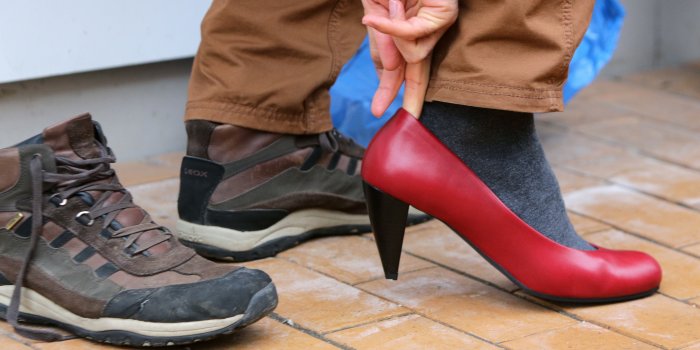Show Empathy But Remember That It May Have Very Negative And Harmful Effect On Your Own Health – Keep Balance – New Study
– It’s important to offer empathy to others in need and remind them that we care.
It certainly helps them to cope with negative emotions.
But we have to remember that putting ourselves in a friend’s shoes, imagining how we would feel if we were the one suffering, may have very negative, harmful effects on our own health, causing a health-threatening physiological response.
“This is the first time we have physical evidence that putting yourself in someone else’s shoes is potentially harmful,” said Anneke Buffone, Ph.D. from University of Pennsylvania and lead researcher of the World Well-Being Project in Penn’s School of Arts & Sciences’ Positive Psychology Center.

However, Buffone says that if an individual can reflect on how the suffering person might feel, they can experience a health-promoting response.
The research, which Buffone conducted with several other researchers revealed that helping behaviors can, paradoxically, lead to both negative and positive health effects.
Their study builds upon previous work. Buffone and her colleagues were hoping to tease apart the factors that might lead to the different outcomes.
In the study participated more than 200 college-age study subjects, hooked up to equipment that tracked a set of psychophysiological factors, such as blood pressure and heart rate.
Participants were provided with the same text, personal story, which was intended to induce empathy by describing the troubled background of the alleged person.
Study participants – divided into three groups – were asked to respond to the writers, through a videotaped message.
One group was told to read while imagining how they would feel if they had had the same experiences; the members of a second group was told to read the story while imagining how the writers would feel and the third were asked to remain objective and detached while reading the statements.
Buffone and colleagues discovered that the very act of helping induced a physiological change in all of the participants, but the quality of that change differed between the groups.
The first group showed signs of the physiological fight-or-flight response, as though they themselves were responding to a threat. The members of the second group, imagining the feelings of the sufferers, showed a more invigorating arousal response, as if they were confronting a challenge that is eminently manageable.
“When we consider the situation with a little more distance, you’re feeling concern, compassion and a desire to help, but you don’t feel exactly what that other person is feeling,” explained Buffone.
The results may be particularly salient to those in care-giving positions, such as doctors and nurses, who may automatically take on the perspective of others.
“Empathy is very important, and for a lot of caregivers probably is the reason they chose their field,” Buffone said. “We don’t have to teach our medical professionals to suppress that emotional response; we just have to try to help them have the right kind of response, thinking of others as opposed to thinking how they would feel in the same situation.”
The research is available – here



 Creators of mankind
Creators of mankind Description of “Tall white aliens”
Description of “Tall white aliens” Where they came from?
Where they came from? About hostile civilizations
About hostile civilizations The war for the Earth
The war for the Earth “Tall white aliens” about eternal life
“Tall white aliens” about eternal life Video: “Nordic aliens”
Video: “Nordic aliens” Aliens
Aliens Alien encounters
Alien encounters The aliens base
The aliens base UFO
UFO Technology UFO
Technology UFO Underground civilization
Underground civilization Ancient alien artifacts
Ancient alien artifacts Military and UFO
Military and UFO Mysteries and hypotheses
Mysteries and hypotheses Scientific facts
Scientific facts


















